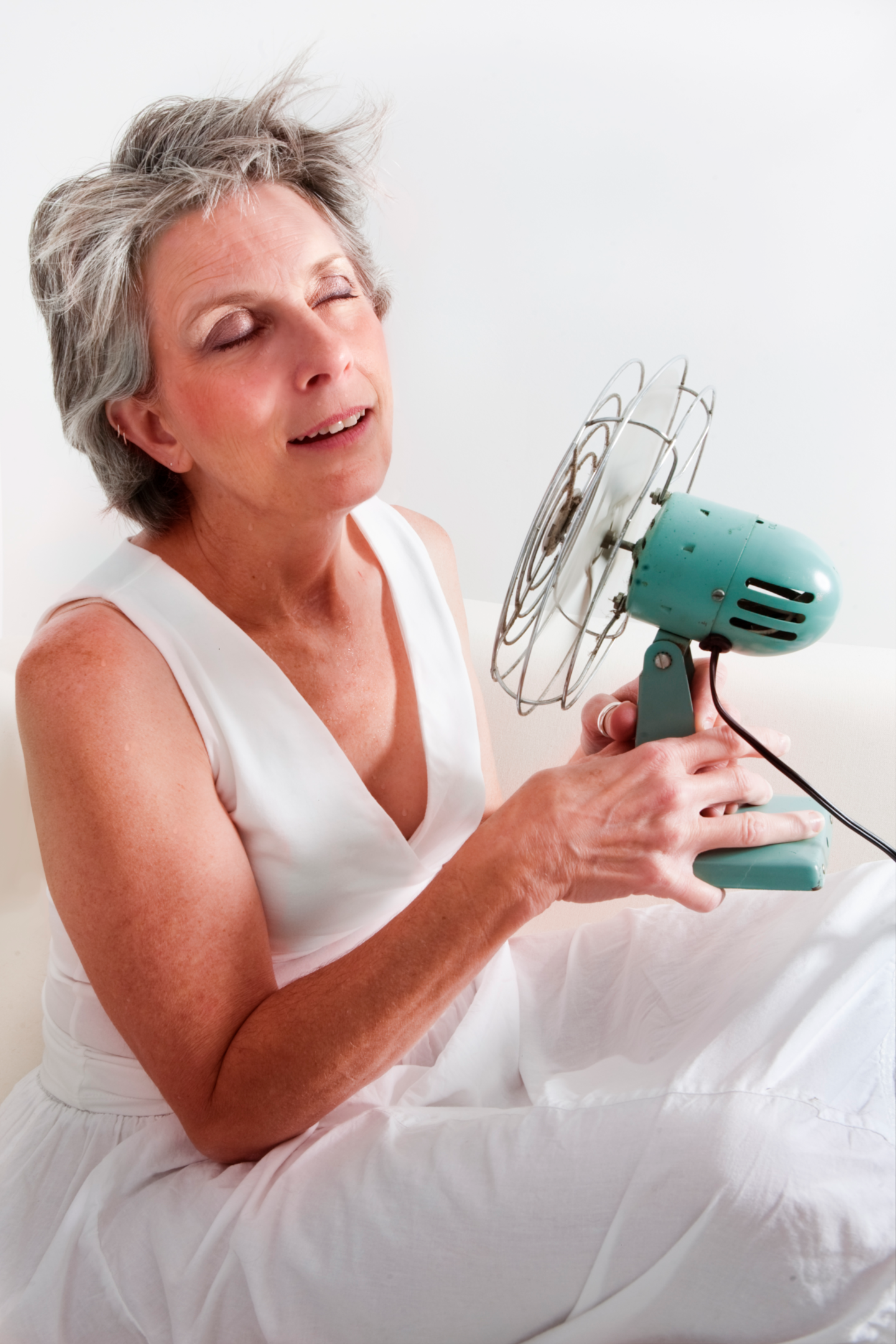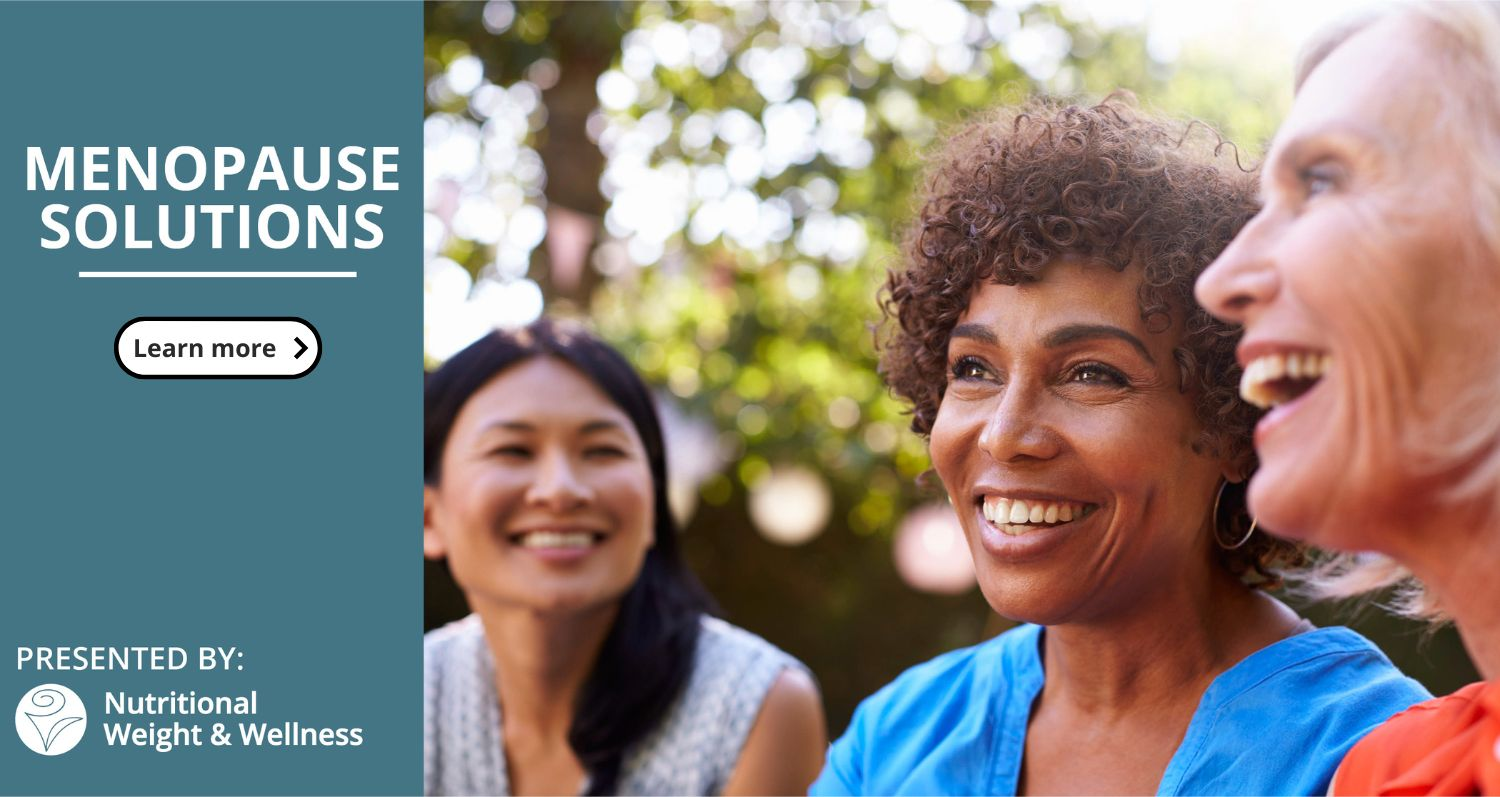
Your Ultimate Guide to Menopause
May 18, 2025
Menopause is a point in time when a women has reached the end of menstrual cycles and the end of their reproductive years. At Nutritional Weight and Wellness, we believe that good nutrition can make the transition through these years smoother.
In this article, we'll cover the basics of menopause, such as when the menopausal transition happens and what causes it. We'll also cover common symptoms of menopause, available treatments, and how making smart dietary choices can significantly impact a women's health during this time.
And, we will give you loads more articles, podcasts, and resources to help you learn everything you need!
Learn more about booking an appointment with one of our Nutritionists.
Learn more about our Menopause Solutions Class

Why does menopause happen?
Menopause occurs because of changes in female hormone levels, specifically estrogen and progesterone. During perimenopause, a gradual decline in ovulation leads to reduced production of estrogen and progesterone by the ovaries. While estrogen levels decrease, they don't drop as significantly as progesterone because other body tissues like fat cells and adrenal glands can still produce estrogen. However, since there's no alternative source for progesterone production, women can become estrogen dominant. Estrogen dominance simply means there's an imbalance between estrogen and progesterone in the body.
Estrogen dominance can contribute to or exacerbate various symptoms and health issues commonly associated with menopause. Balancing estrogen and progesterone levels through dietary and healthy lifestyle choices can be an important part of managing symptoms and associated health risks.
Learn more about hormone balance during menopause:
Dishing Up Nutrition Podcast Episode: Hormone Free Through Menopause
When does menopause occur?
The average age when women experience menopause is typically around 51 to 52 years old. However, the age at which menopause occurs varies. Some women may experience earlier menopause in their late 40s, while others might not reach it until their mid-50s. Family history often influences the timing, with women tending to experience menopause around the age their mother did.
Menopause is officially reached when a woman has gone a full year without a menstrual cycle. Before that point, during perimenopause, the menstrual cycle can become irregular, and menopausal symptoms can emerge. Perimenopause can begin several years before menopause itself.
It's worth noting that the timing of this transition can be influenced by factors like genetic factors, lifestyle, and overall health. Some factors, like smoking or certain medical treatments, can lead to premature menopause or early menopause, while genetics and medical history may cause menopause to occur later.

What are the 3 stages of menopause?
While there isn't a strict division into three stages, the transition can be understood in the following general phases:
Perimenopause:
This is the transitional phase leading up to menopause itself. It typically starts several years before menopause and is characterized by hormonal fluctuations and irregular menstrual cycles. During this time, women might begin to experience menopausal symptoms such as hot flashes or night sweats, mood swings, irregular periods, sleep disturbances, and changes in vaginal dryness. Fertility decreases during perimenopause, but pregnancy is still possible.
Menopause:
Menopause is technically defined as the point at which a woman has not had a menstrual period for 12 consecutive months. This is when the ovaries significantly reduce their production of the hormones estrogen and progesterone, leading to the end of monthly ovulation and menstruation. The menopausal transition usually occurs around the age of 50, but it can happen earlier or later for some women.
Postmenopausal:
This stage begins after menopause and continues for the rest of a woman's life. During menopause, the menopausal symptoms that were common during perimenopause, such as hot flashes and night sweats, may start to decrease in intensity and frequency. However, the decreased levels of estrogen and other hormonal changes can lead to long-term health concerns such as osteoporosis and an increased risk of cardiovascular disease in postmenopausal women.
Learn More about if you could be experiencing menopause:
Article: Differences Between Perimenopause & Menopause

What are the signs and symptoms of menopause?
The signs and symptoms of menopause can vary widely from woman to woman. Some women may experience only mild menopausal symptoms, while others might experience more severe menopause symptoms.
Common symptoms of peri-menopause and menopause include:
-
Irregular Periods
-
Hot Flashes
-
Night Sweats
-
Sleep Disturbances
-
Mood Changes
-
Vaginal Dryness
-
Menstrual periods
-
Urinary Incontinence
-
Painful Sexual intercourse
-
Fatigue
-
Memory and Concentration Issues
-
Joint and Muscle Aches
-
Decreased bladder control
-
Weight Gain
-
Hair and Skin Changes
-
Heart Palpitations
-
Increased Blood Pressure
-
Headaches
It's important to note that not all women will experience all of these menopausal symptoms, and the severity of symptoms can vary.
Listen: Signs & Symptoms Of Perimenopause & Menopause
Menopause: Changes in Skin, Hair, & Nails
How long do you have symptoms of menopause?
The duration and intensity of menopausal symptoms can vary significantly from woman to woman depending on various factors, including genetics, overall health, lifestyle, and individual hormonal levels. On average, symptoms can last for a few years, but some women might experience them for a shorter period, while others might have symptoms that last much longer.
Once a woman has reached menopause (defined as 12 consecutive months without a menstrual period), some of the more acute symptoms like hot flashes might start to decrease in frequency and intensity. However, other menopausal symptoms, such as changes in vaginal health, bone density loss, and potential cardiovascular concerns, can persist beyond menopause.
Treating menopausal symptoms: What's right for me?
While there are numerous treatment options available to address hormone balance, it's truly remarkable how a few fundamental lifestyle factors can profoundly impact our bodies' hormone metabolism. At Nutritional Weight and Wellness, we firmly believe that the starting point for your menopause journey should always be nutrition.
Menopause and Nutrition:
If you're experiencing menopausal symptoms such as hot flashes, fatigue, mood swings, insomnia and weight gain, a first step is to check your eating habits. We hold the belief that nutrition should be the foundation of menopause treatment for several reasons.
-
The foods we eat directly influence our body's hormonal balance. A balanced diet rich in essential nutrients can help regulate hormones, reduce the severity of symptoms, and promote integrative health & wellness during this transitional phase.
-
Nutrition provides a safe and sustainable approach to managing menopausal symptoms, a well-balanced diet can be tailored to address specific symptoms without adverse consequences.
-
Incorporating the right nutrients into your daily meals can also help mitigate some of the common challenges associated with menopause, such as weight gain and bone loss.
-
Nutrition empowers you to take an active role in your health and wellness. The more you understand about the relationship between what you eat and how it impacts your body, the better equipped you are to help yourself through this transition. By making conscious choices about your dietary intake, you gain a level of control over your symptoms that can be both empowering and helpful.
Learn More: Menopause Diet: Can Nutrition Help Menopause?
Treating menopause symptoms with supplements:
Dietary supplements can provide valuable help in managing menopausal symptoms and providing essential support for your overall nutrition. When hormonal imbalances and physical changes can be challenging, supplements can help bridge nutritional gaps. For example, calcium and vitamin D supplements can help maintain bone health, which becomes crucial as estrogen levels decline and the risk of osteoporosis increases. Additionally, GLA supports skin, nails, and hair and enhances a healthy metabolism.
Other supplements like NutriKey Estro ReBalance and Estro 1-3-C in reducing hot flashes and promoting hormonal balance. However, it's essential to remember that supplements should complement a well-balanced diet rather than replace it. They work most effectively when integrated into a holistic nutrition plan tailored to your specific needs.
Learn more: Our Top Recommended Menopause Supplements
Learn more about managing and treating menopause symptoms:
Dishing Up Nutrition Podcast Episodes: Menopause Relief, Relief For Menopause Symptoms, Manage Menopausal Symptoms, Solutions For Menopause Symptoms, Better Sleep During Menopause, Sleep Problems During Menopause, Experiencing Menopause Fatigue, Foods to Ease Menopause Symptoms
Articles: Menopause Diet: Can Nutrition Help Menopause? How Perimenopause Affects Sleep & What You Can Do About It
Video: How to Manage Hormonal Headaches, Food Swaps for Menopause Symptoms, 5 Foods for Hormone Health

What are hot flashes and how long will I have them?
Menopausal hot flashes, often humorously called hot "flushes," are commonly discussed menopause symptoms and often defined as a sudden feeling of heat, often accompanied by sweating and reddening of the skin.. Dr. Jen Gunter, an OB/GYN and author of The Menopause Manifesto, notes that around 75% of women experience these vasomotor symptoms.
They can occur at various times, with some women experiencing them early on and others not until later in perimenopause or even post-menopause.
Surprisingly, a recent study in the Journal of the American Medical Association (JAMA) found that many women endure hot flashes for up to 14 years, sometimes several times daily.
A form of hot flashes during sleep, called night sweats, further complicate matters, often disrupting both sleep quality and overall quality of life.
“Medically speaking, a hot flush is a wave of heat that envelops the head, neck, upper chest, and arms. It isn’t just a feeling of heat; the body is warm to the touch. Hot flushes may be accompanied by sweating, redness in the face, nausea, agitation, and anxiety. The hot flash experience can vary woman to woman, but here’s one constant – heat.” -Dr Jen Gunter
Avoiding triggers to hot flashes
Common hot flash triggers:
-
Spicy foods
-
Caffeine
-
Alcohol
-
Stress
-
Warm environments
-
Tight clothing
-
Smoking
-
Certain medications
-
Hot beverages
-
Hot weather
-
Strong emotions
-
Fluctuating hormone levels
Reducing hot flashes and/or night sweats:
When dealing with hot flashes and other menopausal symptoms, most women don't immediately think about the impact of their food choices. However, what you eat can have a significant impact on your hormones.
Many women notice that consuming sugary items like wine or sweets can trigger severe hot flashes. In our Menopause Survival Seminar, we introduce a simple concept we call the Menopause Math Equation:

If you're experiencing hot flashes and/or night sweats, the first step is to focus on improving your nutrition, starting with reducing your sugar intake. This is the first of many ways that nutrition can help with your menopause symptoms.
Learn More about Hot Flashes:
Articles: Hot Flashes and Sugar, A Supplement We Recommend for PMS and Menopause, Eat This Not That: Hot Flashes Edition, Hormones, Hot Flashes, & Holiday Fair
Video: Eat This, Not That for Hot Flashes

Does menopause cause weight gain?
Menopause can bring about changes that affect weight. As we age, our muscles might get weaker and we may even lose muscle mass, and this weakening can contribute to weight gain. Interestingly, around 75 percent of menopausal women experience weight gain, even when they didn't anticipate it.
Excess Sugar:
Our bodies might not handle carbohydrates (sugar) as efficiently. This means that when we consume more sugar than our bodies can use, it gets stored as fat, potentially leading to weight gain.
Estrogen surplus:
During menopause, changes in hormones, particularly in estrogen and progesterone, can occur. Excess estrogen, responsible for characteristics like curves and youthful skin, may lead to weight gain during this phase.
It's worth noting that estrogen isn't solely produced by our bodies; it's also present in the food we eat, as synthetic estrogen is sometimes used in livestock farming to promote weight gain in cattle. Consequently, our diet can introduce more estrogen than our bodies require, potentially contributing to weight gain.
Lifestyle:
Lifestyle choices can significantly influence menopause symptoms. Along with nutrition, physical activity, stress management, and sleep habits play pivotal roles in how women experience this life stage. A balanced diet, regular exercise, and effective stress management techniques can help alleviate symptoms, while inadequate sleep and unhealthy eating habits can exacerbate them.
Learn More About Menopause and Weight Gain:
Dishing Up Nutrition Podcast Episodes: Avoiding Weight Gain During Perimenopause and Menopause, Avoid the Menopause Weight Gain, Frustrated With Menopause Weight Gain, Menopause: Increase Zest, Decrease Pounds, Perimenopausal Weight Gain
Articles: 5 Quick Wins To Lose Weight During Perimenopause
Does menopause affect bone health?
One vital aspect of women's health during and after menopause that deserves special attention is bone health. Maintaining bone health is crucial during and after menopause due to significant hormonal changes, including declining estrogen levels. This estrogen drop can weaken bones, causing an increased risk of osteoporosis and fractures, particularly in the spine, hips, and wrists. Understanding this connection is vital for proactive bone health management.
Learn more about supporting bones during and after menopause:
Dishing Up Nutrition Podcast Episode: Keeping Your Bones Healthy As You Age, How Can You Maintain Strong Bones?
Does menopause affect mental health?
Menopause isn't just about physical changes; it can also affect mental health. Hormonal shifts can lead to mood swings, anxiety, and even depression. Experiencing symptoms like hot flashes and sleep troubles can make these feelings worse. The social stigma around menopause and the idea of entering a new life stage can also be emotionally challenging.
It's important for women to know that these emotional symptoms are normal during menopause and that seeking support can make a significant difference in emotional well-being & mental health.
Can menopause cause depression?
Absolutely, the menopausal transition can potentially affect mood, possibly leading to depression in some women. The hormonal shifts, particularly the decrease in estrogen levels, can impact mood regulation and emotional well-being. Estrogen plays a role in brain neurotransmitters like serotonin and norepinephrine, which are linked to mood.
It's crucial to remember that not everyone will go through depression during the menopausal transition, and experiences differ. If you or someone you know is facing depression symptoms, seeking assistance from a healthcare professional is advisable.
Learn more about menopause depression and anxiety:
Dishing Up Nutrition Podcast Episodes: Menopause Depression and Anxiety, Menopause: Moods, Memory, and More, Experiencing Menopause Fatigue
Exploring Your Menopause Support Options
If you've found this information insightful and are seeking comprehensive guidance to help you manage menopause effectively, consider enrolling in our Menopause Solutions Course or booking an appointment with one of our nutritionists.
5 Reasons to Take Menopause Solutions:
-
Dive deeper into the taboo topic of menopause
-
Discover the connection between symptoms, hormones, and nutrition
-
Cut through the noise for real, actionable solutions to manage symptoms naturally
-
Say goodbye to the uncomfortable hot flashes, embarrassing urinary incontinence, unexplained weight gain, surprising hair loss, low libido, and hip and back pain
-
Reclaim your health, feel like your old self again, and transition through menopause with ease
Menopause is natural. Suffering is not.
Learn more about our Menopause Solutions Class.
Our dietitians and nutritionists take the time to really listen. In fact, the initial assessment with your registered dietitian is one and a half hours long … so they have time to listen and learn. They want to fully understand your health history before preparing a complementary and integrative health plan personalized to you.
A plan perfect for the one unique you .
A plan for your everyday life.
A plan with real foods that you enjoy (no Brussels sprouts required, unless you love them).
Our dietitians and nutritionists want to hear it ALL. They want to understand your body’s clues and signals … like muscle aches, fatigue, trouble sleeping, digestive issues, white spots on your nails or brain fog … these are all signals and important clues to help them problem-solve.
Learn more about booking an appointment with one of our Nutritionists.










